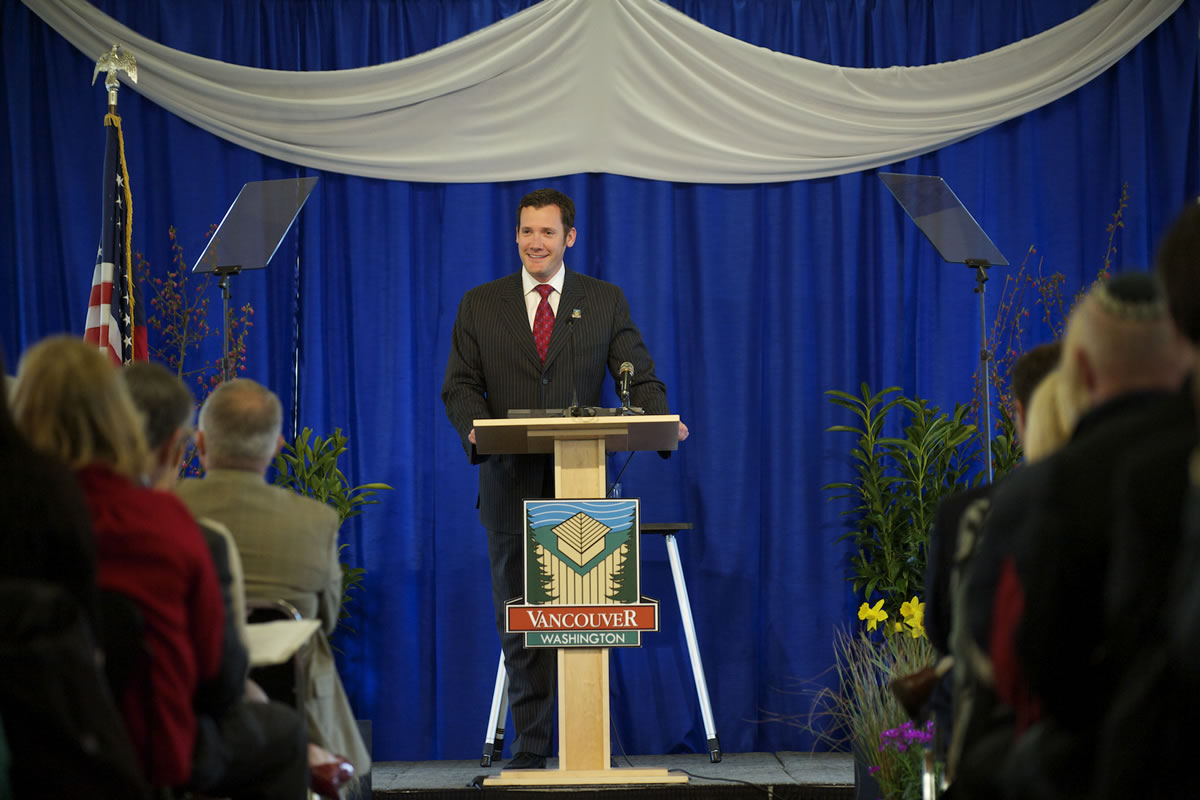The city of Vancouver has redesigned its website to make it more user-friendly.
A “find it fast” section has links for several options, including paying bills or parking tickets, reporting problems or applying for building permits.
The Columbia River was the central theme of Vancouver Mayor Tim Leavitt’s State of the City address Wednesday, which included praise for many and sharp criticism for few.
“As the largest river in the Pacific Northwest, she is our community’s lifeblood, and has been so for thousands of years,” said Leavitt, speaking to a crowd of about 160 people at the Water Resources Education Center. “The river brought us together for trade, for culture, for nature and for community life. And today? Our Vancouver neighborhoods and businesses are connected, from the Port of Vancouver to Vancouver Lake and Burnt Bridge Creek to Wood’s Landing, by inland streams that feed our watershed, nurture our wildlife and green our forests.”
“Indeed, the city of Vancouver incorporated on this great river, long before Washington became a state,” Leavitt said.
The defining river also represents the city’s future, he said.
City officials have a large waterfront park and an extension of the Waterfront Renaissance Trail in their sights. In 2012, crews punched through the BNSF Railway berm south of City Hall, offering a view from the end of Esther Street to the river that had been hidden for more than a century.
After showing new drawings of the proposed park, Leavitt listed several projects, finishing with the Columbia River Crossing.
Starting his sentence with, “And,” Leavitt paused for laughter as the audience correctly predicted what he was about to say.
“Are those seat belts in those chairs? Buckle up, ladies and gentleman,” Leavitt said. “There is no more important opportunity for our city and our region than completion of the Columbia River Crossing. Five miles of highway improvements, bringing aged and decrepit infrastructure into the 21st century.”
Leavitt praised Oregon lawmakers for approving that state’s share of the funding, and federal lawmakers for placing the CRC in the top five most important projects nationwide. He thanked U.S. Sens. Patty Murray and Maria Cantwell and then representatives from “south of the river,” notably leaving U.S. Rep. Jaime Herrera Beutler, R-Camas, off his list.
And while not mentioning Clark County Commissioners David Madore and Tom Mielke by name, Leavitt clearly had them in mind when he quoted New York Times columnist Paul Krugman. Krugman, he said, opined, “We are no longer the nation that used to amaze the world with its visionary projects. We have become, instead, a nation whose politicians seem to compete over who can show the least vision, the least concern about the future and the greatest willingness to pander to short-term, narrow-minded selfishness.”
Madore and Mielke stopped funding the Columbia River Economic Development Council due to its support for the project and passed a resolution opposing the Columbia River Crossing.
“Stable financially, stable operationally and stable in our commitment to do the best we can for the citizens of Vancouver,” he said.
“The city is in significantly better financial condition today than three years ago when I took office,” said Leavitt, who announced last month he’ll seek a second term.
Consolidating five city buildings into the new City Hall saved $1.1 million in operational costs last year, and the city’s credit rating allowed a refinancing of debt that saved nearly $3 million last year in debt payments.
The city council adopted a two-year balanced budget, preserving core services, he said, and through partnerships with Clark County Fire District 5 and Vancouver and Evergreen public schools, extended the life of 15 federally funded police and firefighter positions.
“Navigating successfully through the past several years of rough waters has been a team effort,” Leavitt said. “I’m told of an African proverb that says, ‘If you want to go fast, go alone. If you want to go far, go with others.’ So I challenge each of my colleagues on the Vancouver City Council to renew your commitment to going far, and going together. We set an example for our entire city, and if successful, the community reaps the rewards.”
Leavitt thanked public employees, city volunteers and nonprofit organizations. He thanked businesses that recently chose Vancouver as home, including PeaceHealth. He singled out businesses that have invested in downtown, including Loowit Brewing, Gravitate Design and the Mighty Bowl, the city’s first mobile food cart, and also praised businesses investing in the Port of Vancouver such as Farwest Electric, Great Western Malting and BHP Billiton.
While he snubbed her for her lack of support of the CRC, Leavitt did single out Herrera Beutler for her bill to transfer ownership of Pearson Air Museum from the National Park Service to the city, announcing the bill had made it out of committee Wednesday and was headed for the House floor.
“The spirit of our community is strong,” Leavitt said. “With steady leadership and a forward lean, our opportunities are endless.”
Leavitt, 42, works as an engineer at PBS Environmental + Engineering. He announced last month he’ll run for a second term. He’s raised more than $35,000 for his re-election campaign, and so far no one has publicly announced plans to challenge him. Councilors Jack Burkman, Jeanne Harris and Jeanne Stewart are also up for re-election. Neighborhood activist Anne McEnerny-Ogle recently announced plans to run against Harris.
Stephanie Rice: 360-735-4508 or stephanie.rice@columbian.com.
View a video from the speech on The Columbian’s YouTube channel.



